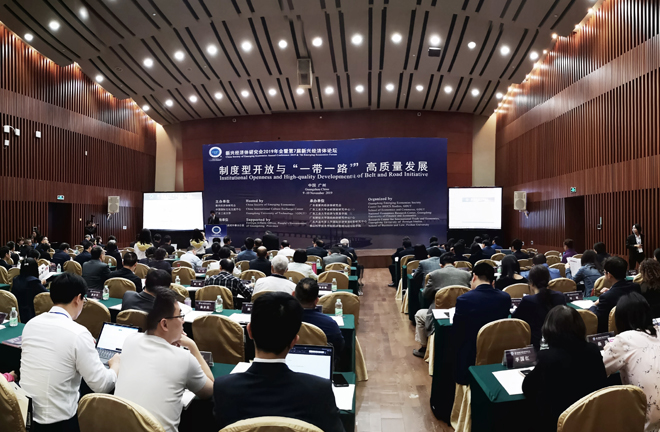Institutional innovation boosts B&R

The forum themed on institutional openness and high-quality development of the Belt and Road initiative in Guangzhou Nov. 9–10 Photo: Lin Yueqin/CSST
GUANGZHOU—Scholars discussed institutional openness and the high-quality development of the Belt and Road (B&R) initiative at the annual conference of the China Society of Emerging Economies and the 7th forum on emerging economies Nov. 9–10.
Hiroaki Kuwajima, a visiting scholar at the University of California Berkeley, said that under the B&R initiative, China has led more countries to develop and make positive contributions to global governance and economic growth.
Marcos De Paiva Vieira, deputy secretary general at Guangdong Emerging Economies Society, said that in the future Brazil could cooperate extensively with China in railway, harbor and airport construction. Chinese development and practice have inspired Brazil to focus on technologies that will truly change the world. Also, it is necessary to keep ethical and moral principles in mind and continuously improve economic openness and growth with a spirit of innovation.
Nuno Vasco, chief scientist of the Digital Transformation CoLab in Portugal, said that we should consider international relations with a more positive attitude, seek common ground and jointly build a community of shared future for mankind in order to tackle poverty and other global issues and thus promote better developments across the world. Cooperation and connection between Europe and China in regard to the environment and the construction of smart cities can be strengthened.
Priya Balasubramaniam, senior public health scientist for the Public Health Foundation of India (PHFI), said that the B&R is a platform for better global cooperation and development that can facilitate joint efforts to cope with public health emergencies and research epidemic diseases. We should establish an innovation platform and increase investments to those projects of great social influence. In this way, the B&R construction will be more efficient and sustainable.
In Vasco’s view, creating a new global governance system that focuses on technological development and builds a close national technology network will revolutionize modern lifestyles. In light of conflict and friction, B&R construction will integrate the development goals of and promote cooperation and exchange among countries along the B&R route, leading the world in a more sustainable and stable direction.
The openness of systems and the high-quality growth of the B&R should be improved theoretically and methodologically. Walter Christman, chairman and founding director of the Global Challenges Forum (GCF) Foundation, suggested that in response to the UN 2030 Sustainable Development Goals, countries should emancipate their minds. While China has been improving itself, it has been gradually taking on more responsibilities for global governance.
Therefore, countries need to establish comprehensive partnerships based on shared values and goals, Christman continued. He put forward three suggestions. First, the world should build a community of shared future, establish effective dialogue mechanisms, and continuously deepen cooperation in technology and knowledge. Second, it is necessary to strengthen interconnection and exchange among various levels in national, regional and international organizations. This would maximize resource utilization and reduce risk. Third, the world should transform concepts into actions so as to promote the deep and practical growth of the B&R initiative.
Christman said that people need to research new methods and modes of thinking to meet the complex and cross-border challenges of the 21st century with a more positive attitude.
edited by NIU XIAOQIAN
